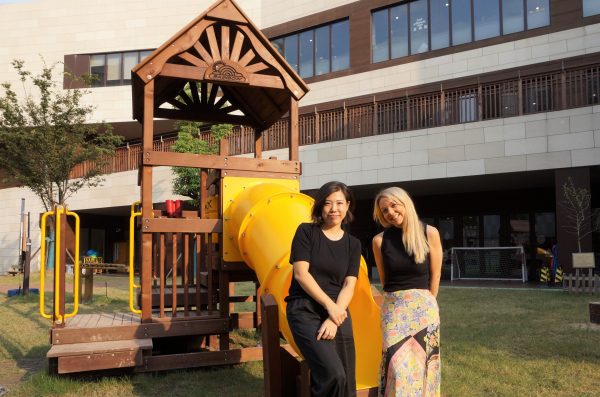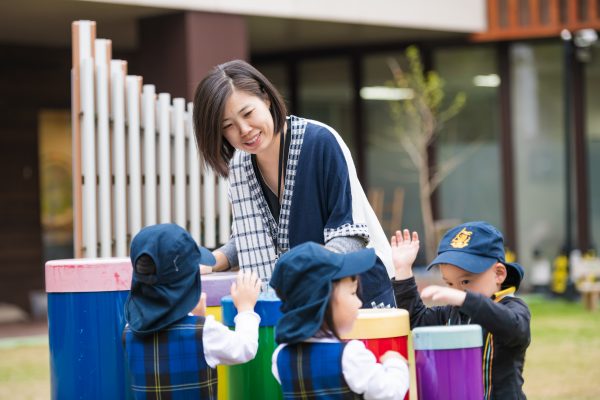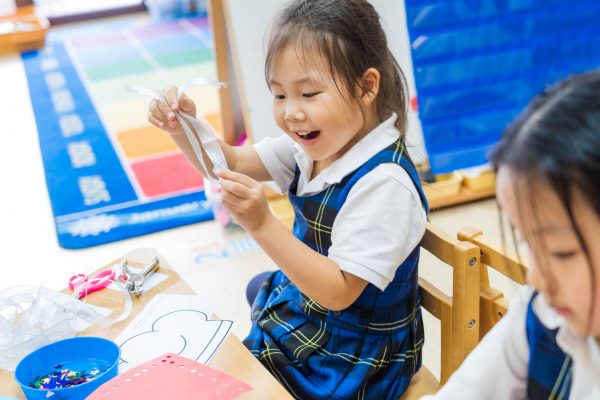
Each new academic year brings new teachers with new ideas, thoughts and perspectives, enriching the nursery and its pupils’ educations as a result. We asked two of our new teachers, teaching pair Angela Gu and Rebecca Harrington, to share their experiences of settling into Hiba Nursery.

Can you tell us a little bit about your careers before coming to Hiba? Angela: I was working in Dulwich Shanghai for almost 10 years before coming here to Hiba Nursery, working with young children there. It was a big change for me to go into a bilingual kindergarten setup after working in local schools before that. This experience showed me how important it is to support both international and Chinese teachers to give the children in our care the best possible education outcomes. It’s not just about translating and working in English then Chinese or the other way around, it’s about learning as much as possible about both languages, both cultures, and using them together as best we can. Rebecca: I was already in China working at LUC Kindergarten which was a great place to become acclimatised to China and the Chinese way of educating young children as the teaching style was very direct. I learned a great deal even in a relatively short space of time. What made you want to come and work here at Hiba? Angela: I had heard how Hiba was committed to making bilingual teaching work as seamlessly as possible and that entirely fits with my own educational philosophy, so that was appealing to me. From everything I had heard and read, it was clear that Hiba was a place that was thinking very carefully about how to bring the two languages together most effectively for nursery-aged children. This was a process I wanted offer my own experience and expertise to.

Rebecca: I was looking for something challenging and the chance to work with outstanding teachers from both China and around the world. The level of resources and the quality of the facilities overall was another big influencing factor for coming here, as I wanted to work in a nursery where the children and their teachers are not limited in their learning and teaching by what is available to them. Here at Hiba, children have opportunities that you wouldn’t normally expect to see. They are young children, but they are treated with a greater level of independence than most places, and I think this makes a huge difference in terms of their ability to learn. What were your early impressions of the nursery once you arrived? Rebecca: I remember being impressed by how independent the children were in their learning and how incredibly professional my colleagues were. Everyone was so engaged in what they were doing, and it seemed that everyone moved with such purpose, with very clear goals in mind – this applies to both the teachers and the children! Having now settled in, I can see that this is the normal atmosphere of Hiba, and not limited to the opening weeks of the term.

Angela: I think my first feeling in those initial days and weeks was that the nursery was a very busy place, but in a happy, contented way! A lot of educational ideas were coming together, so we were all busy trying to make things happen, and we still are. Another important feeling I remember having early on was the sense that it was possible to make important changes and decisions quickly. We have a strong bond with our leaders here, they give us the ability to take charge of our teaching and that is such a satisfying feeling. They listen to us when we share our ideas about how we want to change the educational environment, and they support us in making those changes. What do you think about the Hiba pupils in general? Angela: Sometimes they need a little encouragement to try new things and get involved in activities that push them outside their comfort zone but overall I’m very impressed by their willingness to learn.

Rebecca: I feel like they are very mature. Many of them arrive knowing some English already, their behavioural standards are generally high and their attitude towards learning is positive almost without exception. They come in excited and happy in the morning. You can tell that they want to be here and that they enjoy their time here as well. It is wonderful to see their progression and their ability to quickly adapt to new activities. For example, initially some of them were a little timid and shy but within two weeks they were confidently trying rock climbing! How about the parents? Angela: I think that we have a great working partnership with the Hiba parents. This relationship starts right at the beginning of the year when the parents come in for contact time, as we get the chance to actively show them what we are doing and what we want to achieve. It grows from there – everyday communication is extremely important. I feel that I can tell the parents exactly what we are trying to do and they will understand and work with us because they trust us. I think it helps a lot when we show them hard data such as schemes of play and recorded milestones, behavioural comments and things like that. The parents care very much about their children’s education and they want to know more so they can be more involved. This is a good thing as it helps us work more closely together. Rebecca: Our open door policy really helps engender that necessary level of trust and communication. Each day Angela and I take it in turns to greet the parents and this help us keep them informed of how everything is going with their children while they can ask us anything they want to know. This really helps us make sure that nothing is missed even when the nursery day is very busy. The parents are so invested and involved in their children’s lives and care so much about their holistic development – their social skills, their general health and so on – not just their academic learning. I genuinely feel like they understand what we are trying to achieve at Hiba, so we are lucky to be partners with them. The teaching partnerships are an important element of the way Hiba operates because it lets us combine the best of both international and Chinese education systems. How would you describe your teaching partnership? Angela: All of us new teachers have worked hard to get to know each other quickly and understand each other’s strengths. Rebecca has done a fantastic job of adjusting to Hiba, which is very different to her old setting. Hiba has very high expectations of all its pupils and teachers, so that means there is a certain level of pressure to perform, and Rebecca has done extremely well to handle that pressure so effectively as she has settled in. Even after a short space of time, she is much more confident in managing every element of her class and teaching methods. Rebecca: It is great working with Angela and we’ve formed a close teaching partnership. I have learned so much from her and she has given me so many brilliant ideas to help improve different facets of my teaching. Like me, she has come from a completely different setup so she has brought so much experience to the table. This is the main reason I wanted to come to Hiba, to learn more about teaching from great teachers, so I feel like I definitely came to the right place.